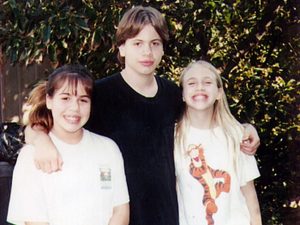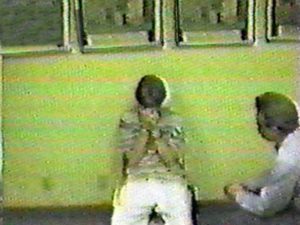By: Michael Crowe
12/05/2003In 1998, 14 year old Michael Crowe was coerced into confessing that he murdered his sister after several grueling rounds of interrogations by Escondido County, CA. detectives, all of which were captured on videotape. Here’s how he described his ordeal in an article he wrote for Jane magazine December 2002.
My sister was murdered in the bedroom next to mine.
The cops convinced me I was the one who killed her.
I’m still haunted by the sound of screams that echoed through my house one morning in January 1998, when I was 14. I bolted out of bed and saw my mother holding my 12-year-old sister, Stephanie, who was covered in blood and lying in the doorway of her bedroom. I didn’t know it yet, but Stephanie was dead. 
First the paramedics arrived, and then the police. The cops took me and my stunned family including my grandmother and youngest sister, Shannon to the station and kept in separate rooms for about seven hours.
The detectives started asking me questions. At that time, I thought maybe Stephanie had had a bad accident. But then the police started hinting that she’d been murdered. They asked if I knew of anyone who’d want to hurt her and whether certain doors were usually locked in my house. If I didn’t know, they’d push me to guess but if I guessed a different way later, they’d say I was contradicting myself. That set the stage for things to come.
When I was finally reunited with my family, we still weren’t allowed to go home. Each of us had to be photographed from all angles while taking off our clothes one piece at a time. I was getting over bronchitis and was very shy, and my sister had just been slaughtered, but the police didn’t show us any sympathy at all.
After that, Shannon and I were told we had to be sent to a center for abused and neglected children. The reason: Stephanie was murdered in our house. We cried and said we didn’t want to go. That night, Shannon and I didn’t sleep. We’d lost our sister, and now we were afraid we might never see our parents again.
The next day, when I was taken back to the police station, I tried to be helpful. But after a few hours of questions, one detective suddenly said, “What did you do with the knife?”
I didn’t even know my sister had been stabbed. “What knife?” I said.
“You know what we’re talking about,” he answered.
I kept saying, “No, I don’t know.”
And he’d say, “Well, “‘I don’t know’ is not a good enough answer.”
Confused and terrified, I insisted I didn’t do it. They had me take a Computer Voice Stress Analyzer Test, a.k.a. a crappy version of a lie detector, which I thought would prove my innocence. Then they told me I’d failed everything.
I was so exhausted, I could barely stand. At times I was sobbing, but the interrogation continued for three-and-a-half hours. They said they’d found blood in my bedroom and that whoever did it must have already been in the house. They described more and more evidence they supposedly had against me. That’s when I said, “Well, if I did this, I don’t remember it.” And they said, “Sometimes that happens.”
Nobody told me that police are legally allowed to lie during interrogations. Instead, I started believing maybe I’d blocked the whole thing out.
The following day, I was arrested. The cops said if I told them what happened, they’d help me. If not, I’d go to prison. So, after hours and hours, I said, “Okay, this is going to be a lie, but And I told them my sister and I were rivals, I hated her and that I killed her. But I didn’t.

They took me to juvenile hall, where I was put in maximum security. I felt like a zombie. When I told my parents about the way I was questioned, they told me not to talk to anyone else, except my attorney. I was locked up for seven months until I was finally released on bail.
Fortunately, my interrogation had been videotaped, or else, I’d probably be in jail right now. At the pretrial hearing, the judge recognized that I’d been coerced, so he refused to allow my confession as evidence. It turns out that no blood was found in my room, one door had accidentally been left unlocked that night, and a mentally ill man named Richard Raymond Tuite had been seen looking into people’s windows in my neighborhood. The police knew all this the whole time, but they had released Richard because they thought he was too clumsy and drug-addled to be capable of killing.
In January 1999, the case against me was dismissed when Stephanie’s blood was found on Richard Tuite’s shirt from that night. The trial against him is coming up in early 2003, five years after my sister’s murder.
I’ve changed a lot. I have difficulty being in groups. When I go out, I still hear people say, “That’s they guy who killed his sister.” I’m shy to the point of being antisocial. So, my number of friends is down to just two: my fiancée and my best guy friend.
Most of all, though, I haven’t yet begun to deal with the loss of my sister. I’m going to need to get over everything else before I can even touch that. But right now, I’m still trapped somewhere in the grief.